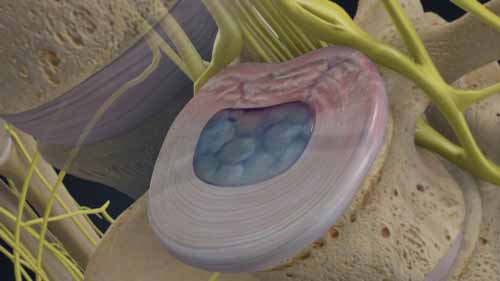Disc degeneration is one of the most common causes of low back, leg neck or arm pain. The spinal discs, which separate the vertebrae of the spine, are soft and compressible. Over time, loss of the water content in the discs as part of the aging process causes them to be less flexible. Fluid loss also results in the discs flattening, which reduces the spacing between the vertebrae through which the nerve roots pass.
If small tears or fissures in the outer layer of the disc occur, it could cause the disc to bulge out, rupture or break into fragments. The bulges, ruptures or fragments can then compress adjoining nerves resulting in pain.
There are different stages of degenerative disc disease, which can determine the symptoms you might suffer.
Stage 1
In the beginning, the spine may lose its normal balance or curvature. During this time, the discs, nerves and your posture may suffer. You are not likely to feel any pain but might experience some minor discomfort. You could also feel lethargic or experience changes in your posture to compensate for the slight degeneration of the discs.
Stage 2
At this stage, your postural changes may be greater as the degeneration is greater. It’s estimated that by age 40, about 78% of men and women exhibit moderate disc degeneration. During this phase, a person is much more likely to feel some aches and pains as well as fatigue. Unfortunately, many people will think the diminished energy and aches and pains are normal and not a sign of degenerative disc disease.
Stage 3
Further posture issues occur at this stage. However, there is also further damage to the spine as more severe nerve compression is likely, bone spurs may form and compress nerves and the individual may always feel tired.
During the final stages of lumbar degenerative disc disease, a person will begin to feel great discomfort and pain that radiates into the hips, legs and back. The final stages of cervical degenerative disc disease will cause pain in the neck and pain that radiates down the arms. Disc degeneration can cause or augment other conditions like spinal stenosis, the narrowing of the spaces in the spine, spondylolisthesis, the slippage of one disc over another or osteoarthritis of the spine.
If you have been diagnosed with the early stages of degenerative disc disease, conservative therapies such as physical therapy or pain relievers can alleviate some of the symptoms. However, if those treatments fail, surgery may be the next option.
Our surgeons at The Bonati Institute are experienced in performing discectomies, laminectomies, facet thermal ablations and more, all of which are surgical options for degenerative disc disease. If you have been diagnosed with this condition and are seeking surgical treatment, please feel free to contact us at any time.

